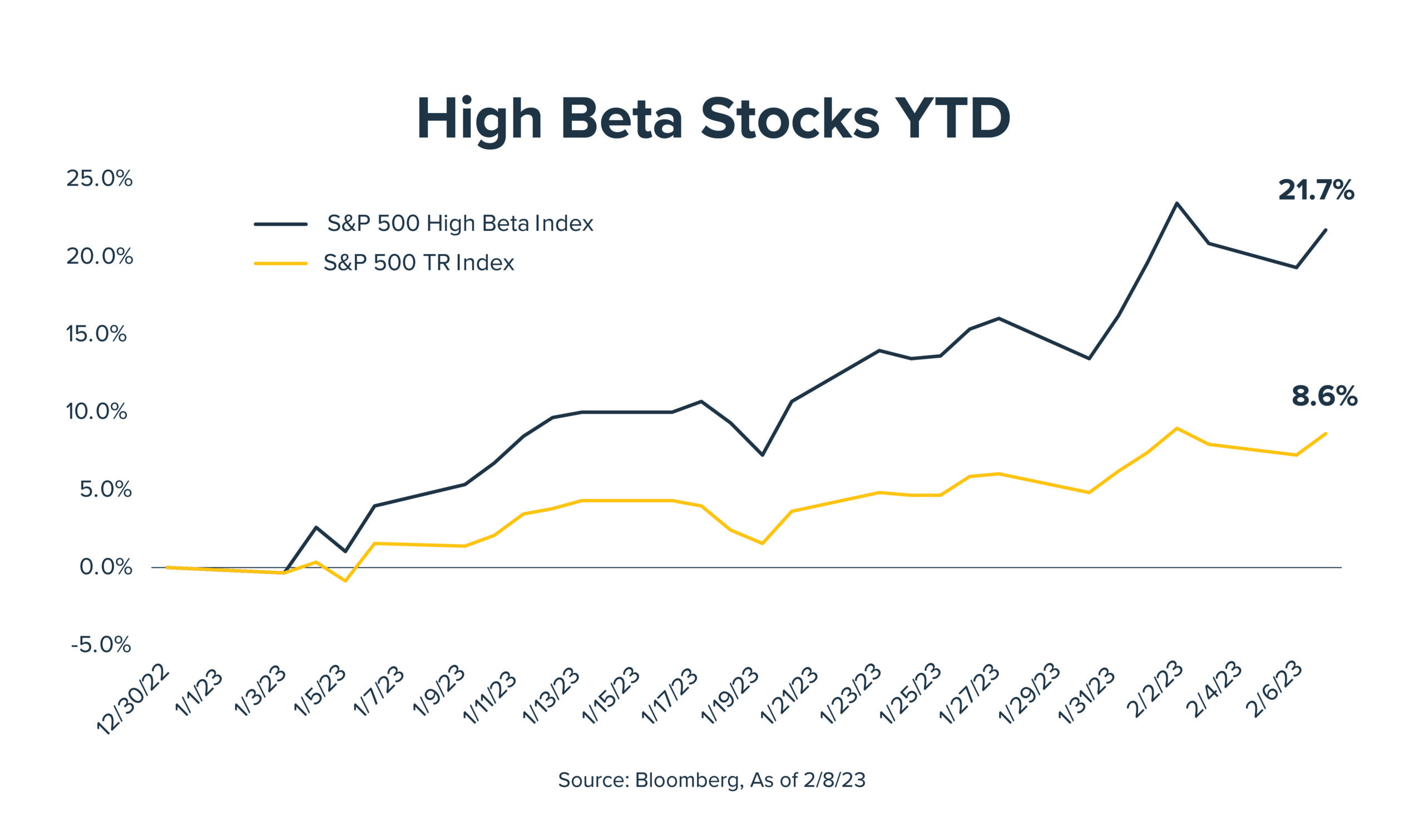In the wake of a bruising 2022, investors seem to have decided that “risk on” is where it’s at this year. Case in point: High-beta stocks—those with higher-than-average volatility compared to the overall market—have soared 21.7% year to date versus just 8.6% for the S&P 500 Index (see the chart).
It’s the best annual start for high-beta stocks since 1991—a year that saw these risky shares gain a whopping 59%. It’s also a major about-face, as just two months ago, it was low-volatility stocks that were outperforming and helping investors avoid some of the market’s biggest woes.

High-beta stocks’ recent run-up is fueled by fresh signs that the economy may be healthy enough to avoid the recession many on Wall Street have long been predicting. For example:
- Continued labor market strength. The economy added 517,000 jobs, and the unemployment rate fell to 3.4% last month—its lowest level since May 1969.1
- Better-than-expected corporate profits. Earnings growth has been trending lower, with negative year-over-year growth in the fourth quarter of 2022 for companies in the S&P 500 Index. Despite that, the results have been better than anticipated: In aggregate, companies are reporting earnings that are 1.5% above estimates, as reported by FactSet.
- Lower inflation. On a month-over-month basis, inflation came in at or below expectations from October through December. The Consumer Price Index actually fell by 0.1% month-over-month in December—the first such decline since May 2020.1
The obvious question: Can high-beta stocks keep it going and repeat their early ‘90s results? While it seems that the probability of an economic soft landing has risen, it’s far from a sure thing. As we’ve noted often, the Fed is committed to bringing inflation down to its target level. If that requires more interest rate hikes than investors foresee happening, it could have a cooling effect on some key drivers behind high-beta stocks’ recent outperformance.
Indeed, Fed Chair Powell pointed out this week that taming inflation could require an even sharper rise in rates than projected, which pushed market expectations for rate hikes to near all-time highs.
Overall, we have slightly increased the risk in Horizon’s portfolios while remaining somewhat cautious as we evaluate whether the market may be too sanguine about the future.
1 Bureau of Labor and Statistics
This commentary is written by Horizon Investments’ asset management team.
Past performance is not indicative of future results. This information is for educational use only and should not be considered a recommendation to buy or sell any security. High beta stocks are not suitable for all investors and carry additional risks. High beta stocks are those that are positively correlated with returns of the S&P 500, but at an amplified magnitude. Because of this amplification, these stocks tend to outperform in bull markets, but can greatly underperform in bear markets. All investing involves risk.
Nothing contained herein should be construed as an offer to sell or the solicitation of an offer to buy any security. This report does not attempt to examine all the facts and circumstances that may be relevant to any company, industry, or security mentioned herein. We are not soliciting any action based on this document. It is for the general information of clients of Horizon Investments, LLC (“Horizon”). This document does not constitute a personal recommendation or take into account the particular investment objectives, financial situations, or needs of individual clients. Before acting on any analysis, advice, or recommendation in this document, clients should consider whether the security in question is suitable for their particular circumstances and, if necessary, seek professional advice. Investors may realize losses on any investments.
The investments recommended by Horizon Investments are not guaranteed. There can be economic times when all investments are unfavorable and depreciate in value. Clients may lose money.
Asset allocation cannot eliminate the risk of fluctuating prices and uncertain returns. All investing involves risk of loss, and in periods of market growth, risk mitigation strategies can be expected to lag in performance behind equity strategies that do not focus on risk mitigation.
This commentary is based on public information that we consider reliable, but we do not represent that it is accurate or complete, and it should not be relied on as such. Opinions expressed herein are our opinions as of the date of this document. These opinions may not be reflected in all of our strategies. We do not intend to and will not endeavor to update the information discussed in this document. No part of this document may be (i) copied, photocopied, or duplicated in any form by any means or (ii) redistributed without Horizon’s prior written consent. Forward-looking statements cannot be guaranteed.
The S&P 500® High Beta Index measures the performance of 100 constituents in the S&P 500 that are most sensitive to changes in market returns.The S&P 500 is a stock market index tracking the stock performance of 500 large companies listed on stock exchanges in the United States. References to indices or other measures of relative market performance over a specified period of time are provided for informational purposes only. Reference to an index does not imply that any account will achieve returns, volatility, or other results similar to that index. An index’s composition may not reflect how a portfolio is constructed in relation to expected or achieved returns, portfolio guidelines, restrictions, sectors, correlations, concentrations, volatility or tracking error targets, all of which are subject to change. Individuals cannot invest directly in any index.
Other disclosure information is available at hinubrand.wpengine.com.
Horizon Investments and the Horizon H are registered trademarks of Horizon Investments, LLC
©2023 Horizon Investments LLC

